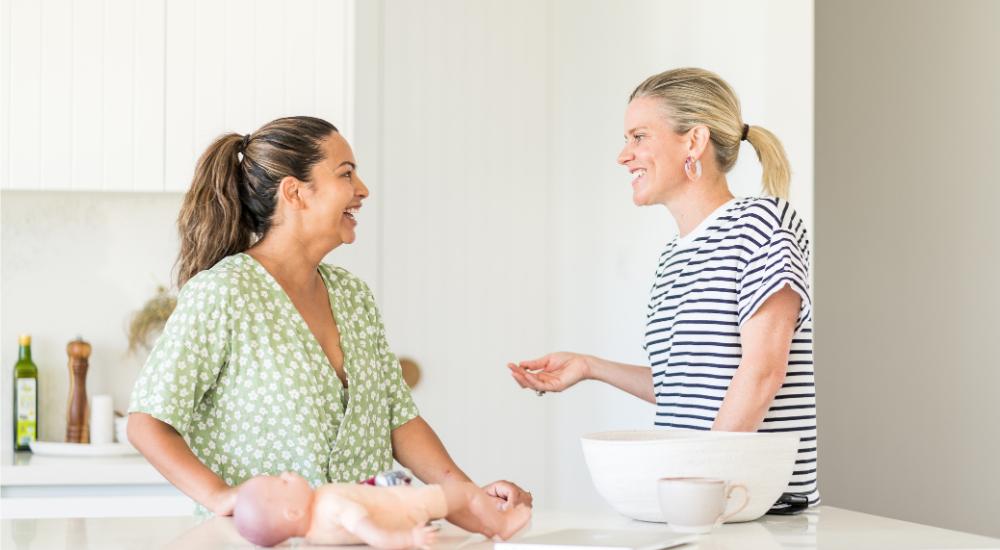5 Things You Need To Know About Baby Movements During Pregnancy
There’s no question that feeling baby movements during pregnancy for the first time is one of the most exciting feelings. It’s almost as though feeling those tiny flutters for the first time makes everything seem more real!
Feeling your baby kick, twirl and stretch inside of you is such an incredible feeling and one you can’t really imagine until it’s happening to you. If you’re reading this and haven’t yet felt your baby moving yet, it’s something I’m sure you’re looking forward to and very curious to know when it will happen, what it will feel like and what you need to monitor.
Aside from providing for some entertaining moments (like when you’ve got a little foot poking out your side for instance!), fetal movement in the womb is one of the ways we can tell if bub is healthy and well. It’s important that you’re aware of them and understand what’s normal and what’s not.
In this post, I’ve broken down everything you need to know based on the five most common questions about baby movements in the womb.
When will I feel my baby move?
Most women will start to feel their baby’s movements for the first time during pregnancy somewhere between weeks 16-22 on average. Rest assured though, that little one has been moving around since they were about 8 weeks or so, they’re just been too small for you to feel!
If it’s your first bub, it may be more like 18 or more weeks until you can feel movement, whereas second and third-time Mumma’s can generally detect those tiny butterfly-like flutters and pops a bit earlier.
At first, you may not feel 100% certain if it was your bub moving, it’s often super faint and almost like wind passing through your body. But once you’ve felt it a couple of times, you’ll soon come to recognise that it’s your tiny bub wriggling around inside. It’s the best feeling!
If you haven’t felt any movements by around 24 weeks, speak to your midwife or healthcare provider who may arrange an ultrasound and other tests, just to make sure everything is OK.
At first, baby movements feel very soft and light. Some women describe them as though popcorn is popping and for others it feels more like little flutters and swishes.
As baby grows, they’re not only getting stronger but their size means their movement is more obvious. You’ll feel very distinct kicks, punches and rolls, and soon enough your partner will be able to feel them from the outside too which is also super exciting for them! Make sure you both enjoy this time and use it to interact with your bubba– you can tap and gently push on the spots where bub is kicking and talk to them as you do.
It’s not all fun and games, there’s no doubt that sometimes bub will get themselves into a position that’s uncomfortable for you! There can be pressure on your bladder or a foot in your rib, and sleeping can be tricky at times too. Usually, your baby will move if you walk around, roll over or give them a little poke.
Baby’s movements will continue to increase in frequency up until around 32 weeks. Once they get to this point, their size means the movements will feel different, but they’ll have established somewhat of a routine when it comes to sleep and wake time.
You may have heard that baby moves less as they grow and start to run of room in the uterus, but this isn’t true. They still move with the same frequency, it’s just because they can’t fully extend their legs and roll around, the movements feel different. Baby will continue to move up until and during labour.
Why are fetal movements important?
Fetal movement in the womb is important as it’s one of the ways we can detect that bub is healthy and well. Think about when you’re not well, you’re generally far less active and moving less. Right? Our babies are the same.
When they’re happy, healthy and well inside the womb, they wriggle, kick and move around. It’s a great sign!
Sometimes, when there’s a change in baby’s movements it can be the first sign that something isn’t quite right and that they may be unwell. This is why being aware and in-tune with your baby’s movements as soon as you first start to notice them, is important.
Should I be tracking my baby’s movements during pregnancy?
No one knows your baby like you do. Once you start to feel your bubba moving inside you, you’ll get to know what’s normal and what’s not.
Some women count kicks and movements and track them throughout the day. But if you’re honest with yourself, are you really going to have time to note down every time you feel your baby move, every day? For most Mumma’s, I think the answer is a resounding no!
A better way to monitor your baby’s movements is to be in tune with your baby’s patterns. Baby’s sleep and rest for periods of about 20-40mins (sometimes up to 90 mins) and you’ll get to know what’s normal for your bub and what’s not.
You’ll probably notice whether they’re active when you lay down at night to try and go to sleep (more than likely, just because!!), after breakfast or once you’ve sat down after a walk. Taking a mental note of when you feel your little bubba moving and recognising their patterns is far more achievable than trying to track and record every single movement.
When should I be worried about my baby’s movements during pregnancy?
As with the above, no one knows your baby like you do. If you notice a sudden drop in movement, a steady decrease over time or a sudden increase that just doesn’t seem right to you, contact your healthcare provider.
More often than not, it’s nothing to worry about.
However, sometimes a change in fetal movement patterns during pregnancy can indicate that there is a problem and your baby isn’t doing as well as we would like.
Trust your gut instincts and always seek further advice if your baby’s movements just don’t feel right to you.




